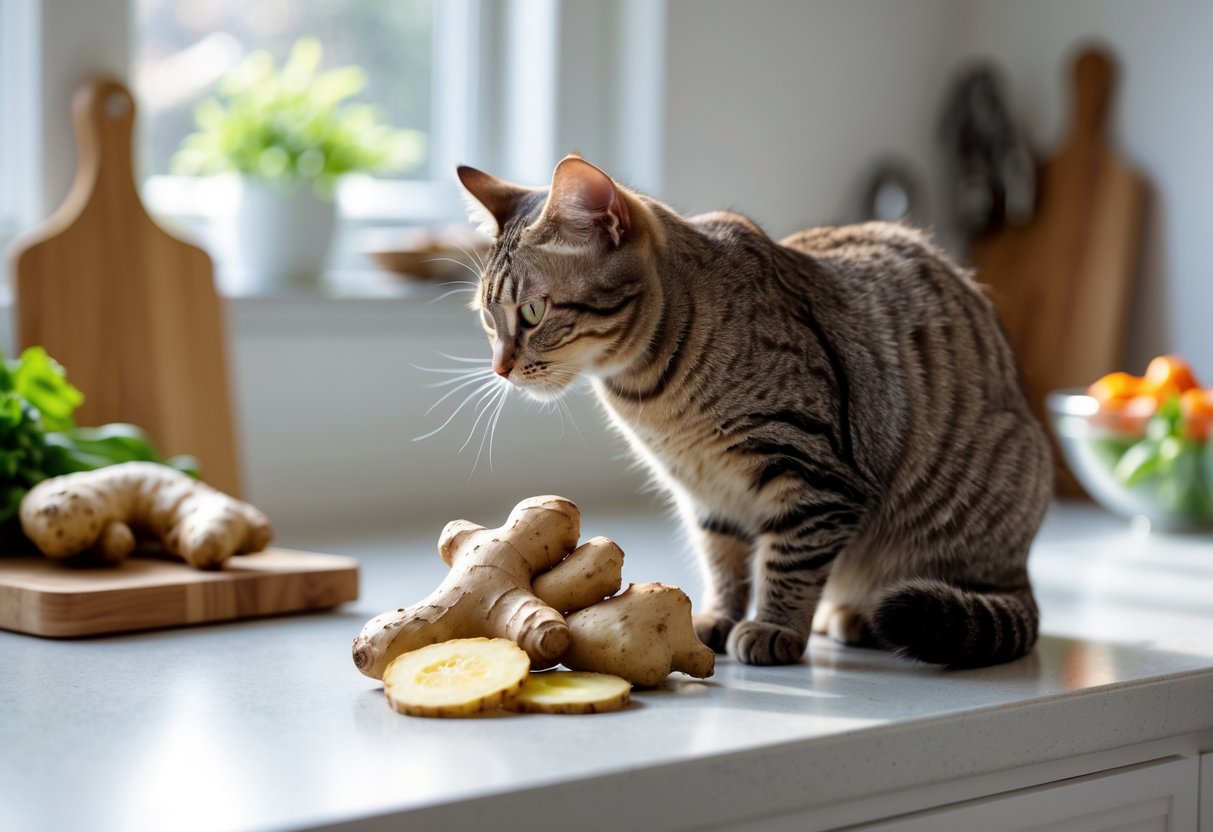Can Cats Eat Ginger? Understanding Safety and Health Implications

Can Cats eat ginger?, yes but only in very small amounts. Ginger is not toxic to cats and can offer some health benefits like easing digestion and reducing inflammation, but it should always be given cautiously and in moderation.
Many cats might not like the strong taste of ginger, so it’s important to introduce it carefully. Pet owners should also talk to a veterinarian before adding ginger to a cat’s diet to avoid any possible side effects or interactions with other treatments.
This article will explain the safe ways to give ginger to cats, the benefits it may provide, and the risks to watch out for. Understanding these details can help pet owners decide if ginger is right for their feline friend.
Can Cats Eat Ginger?

Cats can safely have a tiny amount of ginger, but it must be given carefully. It can help with digestion and inflammation, but too much may cause problems. The way ginger is given and the amount are important to avoid side effects.
Potential Health Benefits of Ginger for Cats
Ginger may help with digestion in cats, just like it does in humans. It can relieve stomach upset and help with nausea or gas. Some cats with inflammation might benefit from ginger’s anti-inflammatory effects.
Ginger can also support the immune system and improve blood circulation. These benefits come mainly from small doses, so giving the right amount is important.
Possible Risks and Side Effects for Felines
Giving too much ginger can upset a cat’s stomach. It may cause vomiting or diarrhea. Cats are obligate carnivores, so their bodies do not handle plant material well.
Some cats might dislike the spicy, strong taste of ginger and refuse it. Always watch for allergic reactions or unusual symptoms after giving ginger.
Recommended Forms and Dosage for Cats
Cats should only get very small amounts of ginger. This can be:
- 1/8 teaspoon of fresh or powdered ginger
- A few drops of ginger extract
- A quarter cup of ginger herbal tea (cooled)
Ginger capsules made for pets might also be used, but only under a vet’s guidance. Never give large amounts at once, and avoid ginger with added sugars or spices.
Serving Ginger to Cats Safely

Ginger can be given to cats in small amounts to support digestion and reduce inflammation. It is important to follow proper guidelines and watch for any signs of negative reactions when introducing ginger to a cat’s diet.
Consulting a Veterinarian Before Feeding Ginger
Before giving ginger to a cat, it is best to speak with a veterinarian. A vet can confirm if ginger is safe based on the cat’s health, age, and any current medications. This helps avoid harmful interactions or risks.
The vet can also recommend the correct amount to feed. Typically, only a tiny portion is needed, such as 1/8 teaspoon of fresh ginger or a few drops of ginger extract. The vet may suggest the best form of ginger, like powder, capsules, or tea.
Taking professional advice reduces the chance of overfeeding and ensures ginger is added safely to the cat’s diet.
Recognizing Allergic Reactions or Toxicity
Cats may show allergic reactions or toxicity if they consume too much ginger or react poorly to it. Watch for symptoms like vomiting, diarrhea, drooling, or changes in behavior.
If a cat develops any of these signs after eating ginger, stop feeding it immediately and consult a vet. Quick action can prevent serious health problems.
Monitor the cat closely for at least 24 hours after first feeding ginger. Early identification of issues allows for prompt treatment and helps keep the cat safe.

Frequently Asked Questions
Ginger can be given to cats but only in very small amounts. It is important to know how safe it is, how it should be given, and what effects it may have on a cat’s health.
